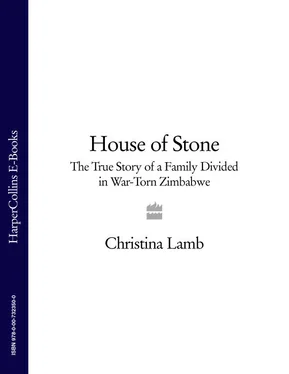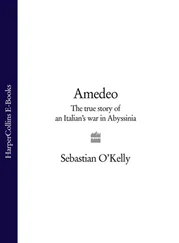‘Where will it stop?’ had been the plaintive cry of a friend from one of the United Nations agencies in Harare. ‘It's just so unnecessary.’ His organization, like all foreign aid agencies, had been banned by Mugabe from assisting the hundreds of thousands made homeless because the President insisted there was ‘no humanitarian crisis’. Later, Mugabe refused to let the UN supply tents to those still sleeping in the open, saying ‘there is no tradition of tents’ in Zimbabwe, and his bulldozers destroyed a model settlement built by the UN in Headlands. I wasn't surprised to read the latest World Bank statistics revealing that 70 per cent of Zimbabweans are living below the poverty line and describing its fall in living standards from 1999 to 2005 as ‘unprecedented for a country not at war’.
The tragedy of Zimbabwe, as my friend from the UN said, is that it is just so unnecessary. But to this African Macbeth it is very necessary indeed. For Mugabe is a man who, in a quarter of a century, has gone from liberation hero and darling of the left to tyrant with much blood on his hands. Staying in power has become synonymous with survival.
This is a story then about two people who have lived through all this, from a brutal civil war to the elation of becoming the last British colony in Africa to win independence; the early optimism and international acclaim, with Mugabe even receiving an honorary knighthood; and then the descent into madness. It is a story of two people, from completely different backgrounds, one rich, one poor, one white, one black, yet it is not about race. Rather it is about power and one violent man trying to save his skin even if he destroys the whole country in the process.
Ethnic cleansing is a loaded term and not quite accurate for what Mugabe has done, though the Ndebeles have been targeted most and he has increasingly surrounded himself with members of his own Zezuru clan whom he has known since the days of the liberation war. Perhaps it should be called political cleansing or class cleansing, for Mugabe's Marxist ideology and loathing of the bourgeoisie underpin many of his actions. Anyone with a different point of view is forced to conform or flee. In the last five years, at least a quarter of the population have left the country-more than 3 million people, including many of Zimbabwe's brightest, such as doctors, nurses, journalists and teachers. Those who remain are enfeebled by fear and hunger, and many are sick. Around a third of the adult population are infected with the HIV virus, and few of those are able to access drugs. Mugabe has even banned church feeding programmes. By 2006 Zimbabwe had the world's lowest life expectancy-just 37 for men and 34 for women. People were so desperate in Zimbabwe's brutalised society that the United Nations Children's Fund reported one child abused every hour partly because of a myth that AIDS could be cured by having sex with a virgin.
Back in 2001, on one of the last times I was actually allowed into the country as a journalist, I went with a group of colleagues to attend a press conference of Didymus Mutasa, hardline Mugabe loyalist and Politburo member. ‘We would be better off with only six million people, with our own people who support the liberation struggle,’ he told us in his soft voice. ‘We don't want these extra people.’ He spoke extremely politely and at the time I thought this was just crazed talk. But Mutasa then became State Security Minister in charge of secret police and it was he who headed Operation Murambatswina. For in the violence-filled years since his threat was made, Zimbabweans have learnt to their cost that Mugabe and his henchmen mean exactly what they say.
London, November 2006
IT WAS ONLY WHEN Aquinata crossed the second of the three rivers where her two brothers lay buried that she felt safe. Her way back from the Catholic mission school went up and down through yellow elephant grass and over rocky kopjes or hills dotted with spiky acacia trees where green mambas lurked. If she walked quickly she could just do it in an hour.
The teachers would always keep back two or three of the girls after school to cook their supper. Aqui hated that. She had never fainted in lessons like some of her friends but most days she had been up since four or five, collecting water and firewood before school, and had eaten nothing since tea in the morning. I would be so hungry in my belly that it hurt just to look into that pot of fine white sadza. Sometimes it would even be fortified with lumps of meat. Yet they wouldn't even give me a scrap.
It also meant she would be walking home as the shadows turned crimson and the sun swelled like an elephant's bottom then suddenly slunk from the sky. That was the hour when trees turned to dark murmuring shapes where spirits or tokoloshis might hide and bad men and animals came out. On what Aqui thought of as the Wrong Side of the rivers, warthogs and vicious dogs might dart from the bush, and once she even saw a cobra lying like a stick across the path, its skin shiny as if coated with dew. In the rivers were crocodiles that occasionally ate people from the village, though that did not stop Aqui and the other children from swimming.
But once she had navigated the log over the middle river, a crossing she could now do in five steps, she would finally be relieved of the fist that clutched at her chest and forced her breathing into an asthmatic wheeze. Then I could walk head high for I was back in my territory, crossing the lands where the ancestors lay buried. The wood-smoke on the wind came from the fires of her people, a subclan of the Zezuru, one of the biggest Shona tribes, and the thump-thump she could hear was the pounding of millet by their women.
Aqui lived among the prickly cactus trees in the so-called Remote Areas of Mashonaland. Her village was named Zhakata's Kraal, after a former headman, and it lay on the highveld in the stony shadow of the Daramombe Mountains behind which the birds chased the disappearing sun every evening. It was not on any map or road and was a long day's walk from the nearest town of Chivhu, a small cattle-ranching settlement that the whites called Enkeldoorn after the Dutch for ‘single thorn’, about 90 miles south of their capital, Salisbury. Zhakata's Kraal was in one of the Native Reserves, communal lands into which blacks had been shunted when the whites came, and it was a desolate place, the surrounding trees all having been shorn of limbs for firewood. The village consisted of a line of round mud-and-pole huts with thatched roofs all facing east and dotted amid large rocks and thorn trees. Chickens scratched in the dust and a stray dog with a withered leg scooted about on its bottom. The headman's place stood on the other side, and a little away was the house of the witchdoctor or nganga near the sacred muchakata tree under which the elders would hold their meetings and lay offerings to appease the ancestral spirits.
Aqui was proud that her parents were very clever and, unlike most of the villagers, did not believe in ghosts or tokoloshis that could possess you, poison your food or bewitch your enemies, but that did not stop her quickening her step as she passed by. Sometimes lightning could turn itself into a ball and chase a person round a hut to strike him dead, as had happened to her father's cousin who let his mombes trample his neighbour's fields and she wasn't sure what that was if not witchcraft. ‘Better to be safe than late [as in dead],’ said her grandmother who saw faces in the fire and was a mhondoro , which meant she had the spirit of a lion and could act as a medium to talk to the ancestors.
Aqui was the eldest of five children. There had been eight of them but two of her younger brothers and a sister had died as infants. Such deaths were common in the village. I think one brother and sister died of dehydration from diarrhoea and one brother from jaundice but my mother said it was because the spirits were not happy The first boy was almost two when he died and my mother said it was because she had met another mother whose child had muti on his head to protect him. The weeping after the death of the first son had gone on for days and he had been buried in the banks of the first river Aqui crossed on the way to school. The elders had explained that children could not be buried in dry places like older people because they are weak and their souls not yet formed so had to be buried in the soft clay of the riverbanks.
Читать дальше












